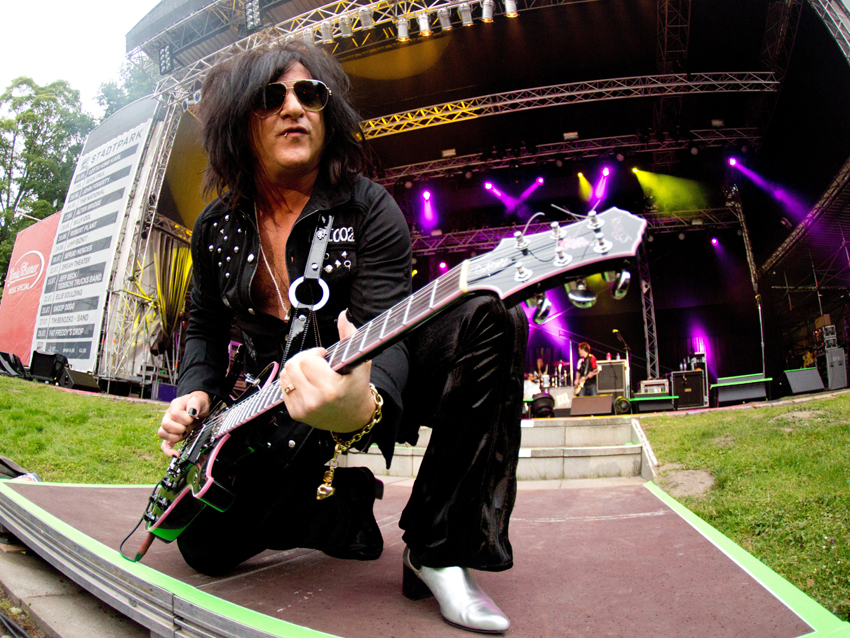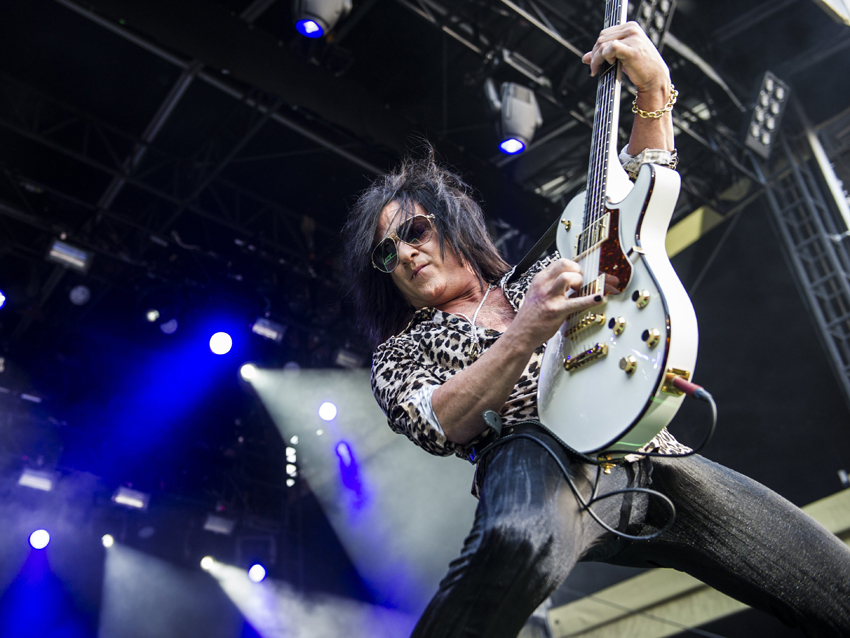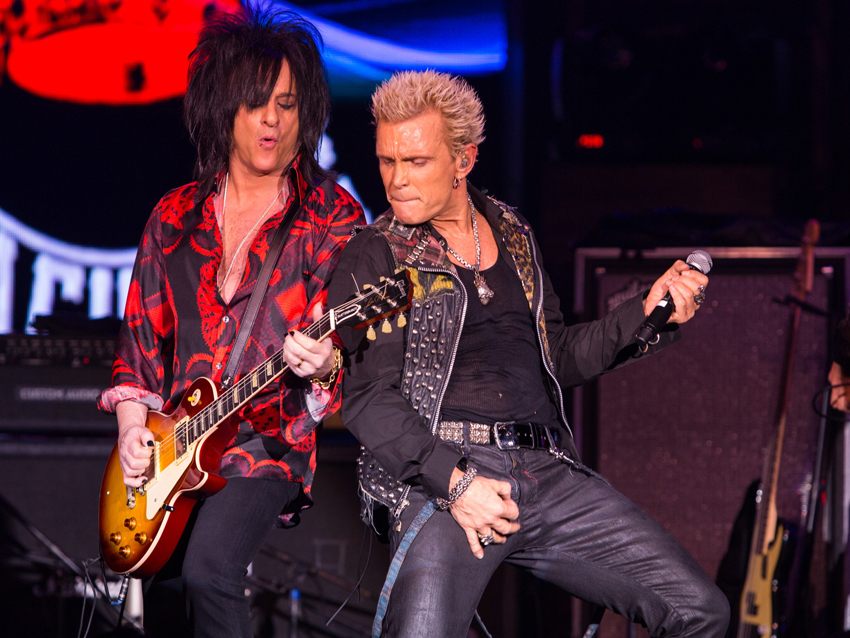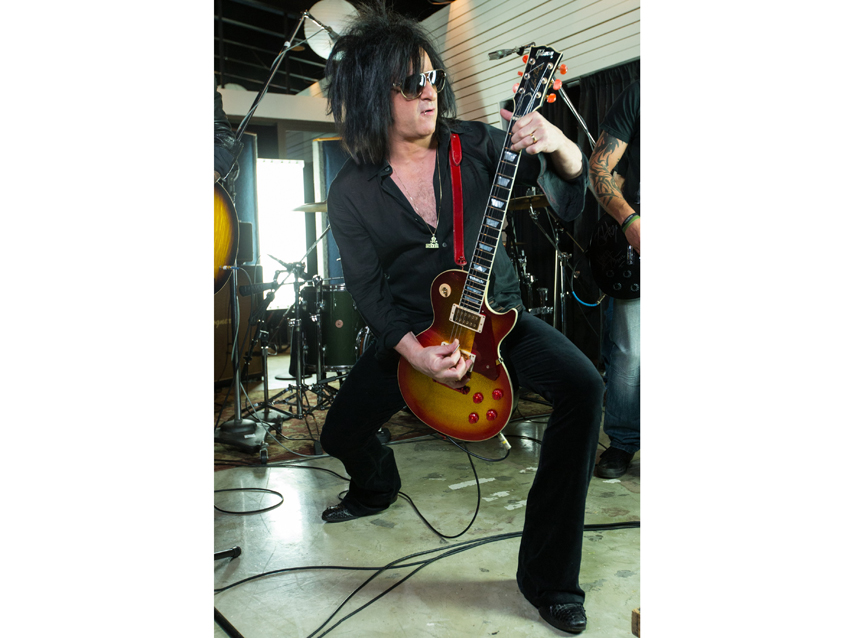
Steve Stevens: my top 5 tips for guitarists
Guitarist Steve Stevens has raves for producer Trevor Horn, who helmed the bulk of the recently released Billy Idol album, Kings & Queens Of The Underground. But his hurrahs and huzzahs aren't strictly limited to the veteran record maker's skills behind the console. Turns out, Horn can rock a pretty big bottom on the bass, as well.
“Going into this record, I had no idea that Trevor could play bass," Stevens says. "I knew of his brilliant work as a producer, sure, and I knew that he was part of The Buggles and that he stepped in and sang for Yes for a time. It was a real surprise to discover what a great bassist he is. He played beautifully on the tracks we cut, and he even made me rethink my guitar parts a bit. His lines were so melodic and counter-rhythmic – they opened up another door to the songs."
Stevens was also knocked out by Horn's studio team, who made the recording sessions so hassle-free that the entire experience was akin to going to "music camp." "All of Trevor's people are really young and knowledgeable, and they're players, too," Stevens says. "In the mornings, I’d come in and they already had guitar sounds up for me. ‘What do you think about this sound? Hey, Steve, how about this?’ I wouldn’t have to get burned out trying to come up with my own sounds, and that allowed me to concentrate on the songs and my actual playing."
Since the early '80s, Stevens has been a groundbreaker of gonzo guitar sound effects, and he saturates Kings Of Queens Of The Underground with plenty of what he likes to call "What-the-fuck-was-that? moments." "It's just always something I've loved, coming up with wild sounds, especially for solos," he says. "On the song One Breath Away, the solo is from my home demo. I have two Sears Craftsman cases filled with pedals. I linked up a bunch of them – I think there’s a DigiTech Synth Wah, a Whammy pedal and a Roland Stutter pedal – and got something really cool. We tried to beat it in the studio, but Idol liked the one I did at home the best. Sometimes you get those happy accidents."
Billy Idol's Kings & Queens Of The Underground is available on iTunes and at Amazon. On the following pages, Steve Stevens runs down his top five tips for guitarists.
NEXT: Listen outside of your chosen genre

Listen outside of your chosen genre
“If you’re a rock or blues guitarist, try listening to stuff that’s outside of your wheelhouse. Checking out some classical music or jazz could give you a new perspective on the guitar that you won’t find if you only listen to the same things over and over.
“Allan Holdsworth imagines himself as John Coltrane when he plays, and I think that's part of what goes into his unique style. He's not even thinking about the guitar; he's got the sound of a saxophone in his head. Same with Jeff Beck – he listens to Bulgarian chant music and went through his electronic phase. These guys don’t stay in one box; they don’t listen to only one thing, and it shows in their own music.
“I still approach my guitar parts for a song the way the early prog guys did. I arrange different sounds and textures, and sometimes I’ll throw in something that’s a little jazzy or even flamenco-inspired. Whatever comes into my head – I mix it all up. It’s not just rock guitar the whole time, even though the song might be rock.”
NEXT: Remember: The singer is king

Remember: The singer is king
“If you’re a guitarist in a band, you might not want to hear this, but it’s true: The singer is the king, and your guitar is a vehicle to help tell the song’s story. What that means is, staying in your own little guitar bubble world isn't going to make you very effective at telling that story.
“You’re also going to have a constant battle with the singer: ‘I can’t sing to that. You’re too busy’ – he'll he staying that sort of stuff to you, and he'll be right. There’s always a time and place to play something busy, but you have to remember that you’re part of an ensemble and you’re all playing the same song.
“The most important part of that ensemble is the singer, the storyteller. As a guitarist, you should be aware of what the song is about and even what the lyrics are. That’ll help you to construct melodies, chord structures and solos that all work for the song. But always remember that the singer is the main focus. If he doesn’t sound great, it doesn’t matter what you’re doing.”
NEXT: Arrange your guitar parts independent of other instruments

Arrange your guitar parts independent of the other instruments
“I hear a lot of demos of bands in which the bass is going along with the root note of the guitar, and they’re just chugging along, chugging along. Things can get kind of boring that way – you get ear fatigue.
“One of the first things I learned from producer Keith Forsey was how to figure out guitar parts that worked melodically but weren’t just sticking to the same root note or even the same rhythmic pattern that the drummer was doing. Once I tagged onto that idea, I was amazed at how great the songs started to sound. Everything seemed to open up and get more interesting and exciting.
“In Rebel Yell, I never play the root chord; I’m always playing an inversion of a major seventh. It’s a weird thing, but it works. So you’ll never hear me playing the bottom note of what the bass is doing. I’ve played with other guitarists in Camp Freddy, and I always have to tell them, ‘No, I don’t play those chords. Try it like this.’ I’ll show them what I do, and they’ll be like, ‘Oh, wow – now it sounds like Rebel Yell!’” [Laughs]
NEXT: Research how to record your guitar

Research how to record your guitar
“Don’t just leave it up to the producer or the engineers how to record your guitar. Learn how to do it yourself. Sometimes you’ll get an engineer who’s been working 12-hour days, eating crappy food and drinking bad coffee, and he’ll just throw up some mics the way that he’s been doing for 20 years. You might get a decent guitar sound or even a good sound, but it won’t be the one you have in your head.
“There’s so much information on the internet now, with YouTube videos showing you how different mics work. Even if you don’t have the mics yourself, you can see what they do and how they affect your sound. That way, if you get in a studio and they have those mics, you can tell the producer or engineer, ‘Hey, I saw something on the internet – can we try such and such out?’ Or play them something on a CD – ‘Can we get a sound like this?’ And they’ll figure out what to do. That’s their job.
“I bring my own mics with me to sessions, because I know how they sound and where I want them placed. I’ve never had an engineer get upset or offended. If anything, I’m making his job easier.
“The producer Neil Dorfsman showed me one of the most important aspects to getting a good guitar sound. You have to make sure that your mics are perfectly in phase with one another, and the only way to do that is to listen to the white noise of the amp and put each mic out of phase till it disappears. That’s what I do now. I’ve taught engineers how to do it. It only takes 15 minutes, and then you’re done.”
NEXT: Be a positive person who's part of a collective

Be a positive person who's part of a collective
“I’ve been with Idol for 32 years now, and I’ve always been the musical director. From the day I met him, I helped put his band together. Over the years, we’ve hired maybe 20 or so musicians. Sure, I look for people who can play, but just as important, I want people who are going to contribute in a positive way.
“Our rhythm guitar player, Billy Morrison, who ended up co-writing most of the songs with us on the new record, he’s a fairly rudimentary guitarist. He’ll be the first to tell you – he’s from the 1977 British punk-rock school. But he’s such a positive force in our band that his personality permeates our rehearsals. We’re all just so happy to be there.
“I can’t tell you how many bands I’ve gone into where there’s bad vibes or doom and gloom. You’ve always got that one guy with a problem – it's a drag. I’d rather be with somebody I have to challenge musically as long as he's a good person. If somebody is willing to be part of a team and will put in the work, that makes up for a lot."
Joe is a freelance journalist who has, over the past few decades, interviewed hundreds of guitarists for Guitar World, Guitar Player, MusicRadar and Classic Rock. He is also a former editor of Guitar World, contributing writer for Guitar Aficionado and VP of A&R for Island Records. He’s an enthusiastic guitarist, but he’s nowhere near the likes of the people he interviews. Surprisingly, his skills are more suited to the drums. If you need a drummer for your Beatles tribute band, look him up.
